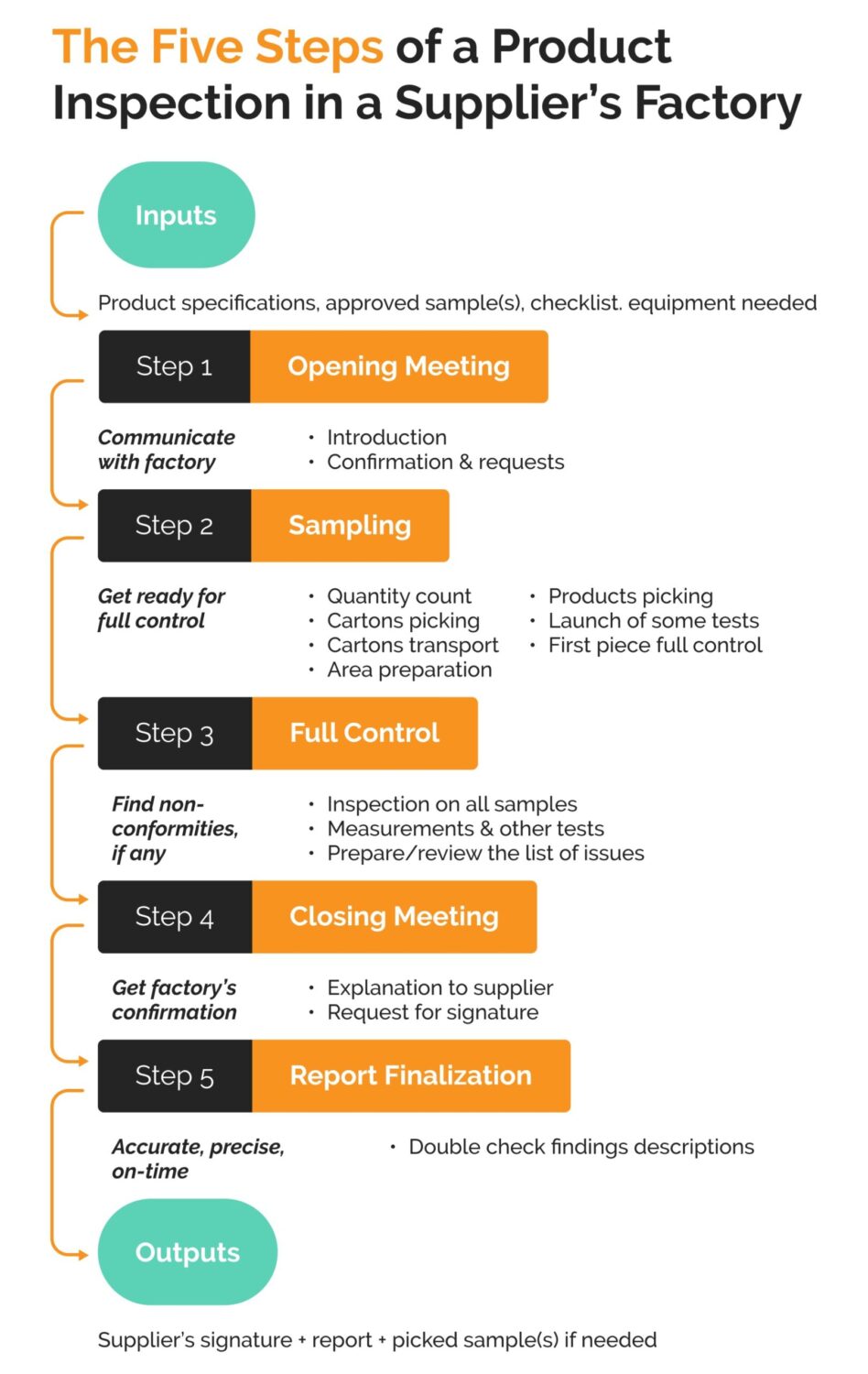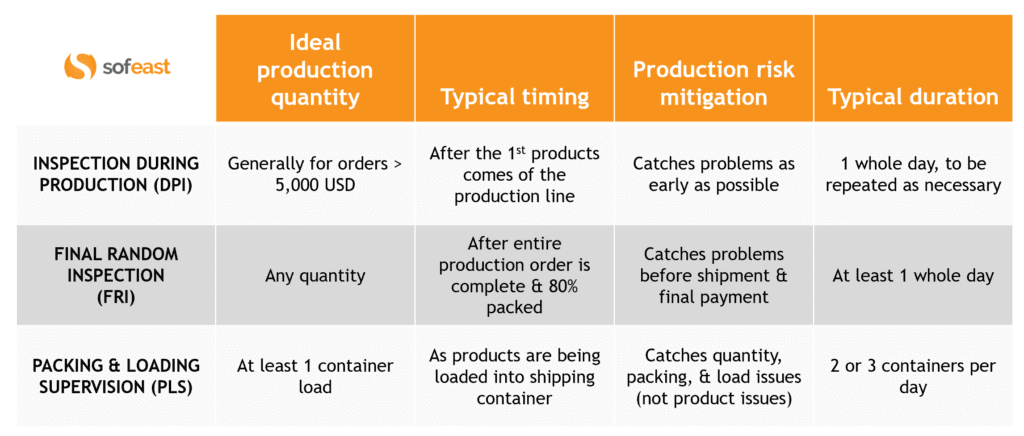Sofeast offers a full range of product inspection solutions throughout the production process on-site at your supplier’s facility in China, India, or throughout Asia. Each inspection is tailored to your product and requirements and comes with a set cost.
Our quality inspection team offers you the following types of product inspection solutions that appear on this page for most consumer goods (electronics, garments, toys, furniture…) and many mechanical products (for automotive or industrial use).
How and where Sofeast provides you with the most value when purchasing our product inspections.
Sofeast’s inspection activities serve mainly 3 types of products, due to our past experience and where we see we can provide value:
- Custom-designed electronic products for B2B or consumer use in China, India, Vietnam
- Custom-designed plastic or metal products (somewhat mechanical) in China, India, Vietnam
- General apparel products ordered in relatively high quantities, in Asia / Middle East / Europe
We also work on medical devices and automotive parts, typically in the context of a wider QA program.
However, we avoid working on what are usually “cheap products”: gift & premium, low-cost footwear, low-end furniture, etc.
Learn more about each product inspection and get a quote
Hit the blue buttons below to read more each product inspection* and request a quotation if you’d like to get pricing for your project.
Production Monitoring Reporting (PMR)
Inspection During Production (DPI)
Final Random Inspection (FRI)
Full Production Check (FPC)
Container Packing & Loading Supervision (PLS)
Off-Site Product Inspection (OSI)
Supplier & Production Overview (incl. Quality Check)
*(Please note, the fastest way to arrange your inspection is by using this link to request a quote and book your inspection.)

Production Monitoring & Reporting (PMR)

Inspection During Production (DPI)

Final Random Inspection (FRI) Before Shipment

Full Production Check (FPC)

Container Packing & Loading Supervision (PLS)

Off-Site Product Inspection (OSI)

Supplier & Production Overview (incl. Quality Check)
Go back and check each product inspection* by hitting the option below that interests you.
Production Monitoring Reporting (PMR)
Inspection During Production (DPI)
Final Random Inspection (FRI)
Full Production Check (FPC)
Container Packing & Loading Supervision (PLS)
Off-Site Product Inspection (OSI)
Supplier & Production Overview (incl. Quality Check)
*(Please note, the most convenient way to arrange your inspection is by using this link to request a quote and book your inspection.)
Explore how to choose the right inspection, steps and timeline for your project once it begins, and much more in these resources
If you struggle with inconsistent quality, a product inspection at your supplier’s factory will help you by catching issues before production is complete or, worse, is shipped. Our inspector’s subsequent QC report will give you detailed information about your product quality that enables you to put the quality issues right before any bad batches can reach you.
When you use a third-party quality inspection firm like us to check your product quality, you’ll benefit from the following:
- Better control over your supply chain
- Reduced costs in scrap, rework, recalls, late orders, and customer refunds
- Improved product quality & safety
This is a comparison of some of our product inspections. You can choose the one(s) you feel are most aligned with your needs, or discuss them with us and get our recommendation.
This flowchart shows the 5-step process that we typically follow when inspecting your supplier:

Once you book an inspection with us, the lead time is generally 2 full working days for the common areas in China, Vietnam, India, Bangladesh, Pakistan, and Cambodia.
Note, the assumption here is that your supplier responds to our emails promptly and lets us in without delay. We might also have questions about your technical documents, so it is better if you send them to us for confirmation earlier.
All in all, our general advice is to proceed as follows:
1. Once you know there will be inspection(s), let us know.
2. Our QA planning team will be in contact with your supplier, and will follow up as the date changes from a “rough estimate” to a “confirmed date”.
3. Our QA technical team will study your documents and ask questions where something is unclear or needs more details.
You can see a selection of Sofeast’s past inspection reports on various product types ranging from soft lines through to industrial components by hitting the link below:
Correct. Both typically take place after the end of production, at the factory. But they serve different purposes and they don’t occur at the same time.
A Final Random Inspection (FRI) consists of picking samples at random for quality checks. It includes product measurements, function checks, fatigue tests, safety tests when that applies, packaging & labelling checks, etc. In short, the purpose is to confirm that average quality is acceptable… and to allow the buyer to stop the shipment if it is not. That means it is done at least 1-2 days (and hopefully longer) before the ex-factory date, to allow time for at least a quick rework.
Note that, in many cases, there are still some unpacked products at that time, and that’s not necessarily an issue.
In contrast, a Packing & Loading Supervision (PLS) is generally done when the container(s) or truck(s) are loaded at the factory. It is not focused on product quality, as there is no time for doing that properly and our staff has no authority to stop the shipment. It is a last look at the final packing at the time of loading, and it is a supervision & documentation of the way the goods are loaded.
Yes, we can.
We have our own lab for common chemical, performance, reliability, and durability tests or for simple conformity confirmations (comparing colors of samples from different suppliers, running function tests over several days…).
Our spectrometer allows us to confirm that a certain part is made of the right material and to test compliance to RoHS and, for an extra fee, we can even bring it to a factory (as it’s less than 2 kg).
If needed we can work with a number of partner labs for other tests we can’t perform in our own testing lab (sometimes for compliance tests and certifications to CE, REACH, FCC, UL/ETL/CSA, etc.).
When a lot of inspection work is spent on repetitive tasks, there is often a better & faster way to do that work.
Consider QA/QC Inspection Optimization, which complements product inspections, where we can:
- Clarify your QC standard
- Set up a QA plan
- Set up checking gauges/fixtures to speed up QC work
- Confirm a manufacturer’s measurement system
- Our China regional office manages jobs in China, Vietnam, Cambodia, Thailand, Myanmar, Indonesia, and Taiwan.
- Our India regional office manages jobs in India, Bangladesh, Pakistan, and Turkey.
- Our Italy regional office manages jobs in Europe, the Middle East, Africa, and the Americas. Specifically, the following countries:
AREA A*
UK, Ireland, Germany
AREA B*
Italy, Benelux, Switzerland, Austria, France
AREA C*
Portugal, Spain, Morocco, Poland, Czech, Hungary, Slovenia, Croatia, Bosnia, Lithuania, Latvia
Estonia, Israel, South Africa, Argentina, Chile, Brazil, Guatemala, Mexico
AREA D*
Slovakia, Albania, Greece, Bulgaria, Romania, Moldova, Ukraine, Belarus, Serbia, Macedonia, Armenia
Jordan, Dubai, Egypt, Tunisia, Ghana, Ethiopia, Kenya, Mauritius, Madagascar
*Area A is the highest inspection cost ranging to Area D of the lowest cost – please let us know where your factory is and we will confirm the correct cost for your project.
You may also be interested in learning more about improving product quality by reading these blog posts and guides about QC & inspections:
- Sofeast’s blog posts about quality inspections
- Quality Inspection Nuts & Bolts (a collection of many useful posts from QualityInspection.org)
- Discover how sample evaluation and comparison is helpful in order to assure that the samples you’re getting from a potential supplier or from pre-production with your current supplier reach your expectations and you can proceed without the fear of damaging issues with your production batches later on.
- Explore how our in-house IT platform helps create and use your QC checklist for product inspections.
Book your product inspections now
Ready to book a Sofeast product inspection now?
Hit the button below to create a new account with us, log into our IT platform, and set up a new product inspection project in just 2-3 minutes!






